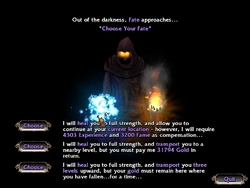RPG Codex Review: Heroine's Quest
RPG Codex Review: Heroine's Quest
Review - posted by Crooked Bee on Thu 1 May 2014, 16:28:34
Tags: Crystal Shard; Heroine's Quest: The Herald of RagnarokJust when everyone had used to the thought that the Quest for Glory series would never see a worthy successor, and the Coles themselves went a seemingly unrelated way with Hero-U, a whole three new Quest for Glory-like adventure RPGs were announced - Quest for Infamy, Mage's Initiation, and Heroine's Quest. The latter was the first one to be released, and for free to boot! (Download it on Steam.) Quality never came at a lower price.
Having nothing to do with mind-altering substances, Heroine's Quest: The Herald of Ragnarok follows the adventures of a female protagonist in a Viking-themed land. It also follows the Quest for Glory formula almost to a tee. In this review, esteemed community member Aeschylus tells you why you should abandon whatever it is you're doing and go download Heroine's Quest right now, especially if you're a Quest for Glory fan. Have a snippet:
Read the full article: RPG Codex Review: Heroine's Quest
Having nothing to do with mind-altering substances, Heroine's Quest: The Herald of Ragnarok follows the adventures of a female protagonist in a Viking-themed land. It also follows the Quest for Glory formula almost to a tee. In this review, esteemed community member Aeschylus tells you why you should abandon whatever it is you're doing and go download Heroine's Quest right now, especially if you're a Quest for Glory fan. Have a snippet:
Once upon a time, in the halcyon days of 1989, Sierra released a strange game called Hero's Quest -- later rebranded Quest for Glory, due to Hasbro's corporate dickery. The game tried things that had never really been done before -- melding RPG character development, classes, combat, and exploration with adventure game-style puzzles and occasional moon-logic. That game spawned a remake and four quality sequels, comprising undoubtedly one of the finest game series of all time. In spite of its success and quality however, Quest for Glory never really spawned any imitators (other than the painfully mediocre BloodNet) and remained for the most part alone in its genre. Over the years there have been a few attempts by fans to create successors -- such as the ill-fated Hero6 project -- but none had come to fruition until finally, this year, Heroine's Quest: The Herald of Ragnarok was released by Crystal Shard Studios as freeware, following up on their excellent adventure game A Tale of Two Kingdoms.
Heroine's Quest is a game that does not so much politely borrow from Quest for Glory as it does tackle it and steal its stuff. Thankfully, it does so for the most part without damaging any of the elements that made QFG great; most everything from the originals is still there, including the three character classes, connections to real-world mythology, adventure game puzzles, stat-building through practice, exploration of a large, hostile forest, goofy, awkward humor, and multiple solutions to almost every situation. The only real difference is that your character has lady-parts. Because of all this it is almost inevitable that Heroine's Quest will be played through heavily tinted nostalgia goggles, but it is also a game that is worthy of consideration on its own merits. The borrowed mish-mash of features for the most part comes together successfully independent of its influences, though not without a few stumbles along the way. There are many elements to discuss, so let's get to it.
[...] The overall difficulty of the puzzles, aside from the few previously mentioned, is fairly moderate. You'll have to think a bit and explore the world carefully, but there are no puzzles that are so out-of-this world logic-wise that they're likely to be a major stopping point. That plus the fact that you generally have a fair number of things to do -- there is a large amount of optional content in the game, though it's only 100% optional for the Rogue -- mean that being completely stuck is likely to be a rare occurence. Getting full points on the other hand is quite challenging and requires you to always do the things appropriate to your class; a Rogue should always steal when possible, a Sorceress should strive to use spells, and a Warrior should always enter combat and search for new weapons. It's worth trying to max out your score, as you're likely to find a few interesting optional sections you would have otherwise missed.
So, after all that, is it worth playing? The answer is very much yes, particularly given that it's free. Heroine's Quest is of a good enough quality that it could be considered a proper entry in the original Quest for Glory series, and that is high praise indeed. It's a well-crafted look back at an era of games that we haven't seen for a long time, but it can very much stand on its own independent of any nostalgia.
Heroine's Quest is a game that does not so much politely borrow from Quest for Glory as it does tackle it and steal its stuff. Thankfully, it does so for the most part without damaging any of the elements that made QFG great; most everything from the originals is still there, including the three character classes, connections to real-world mythology, adventure game puzzles, stat-building through practice, exploration of a large, hostile forest, goofy, awkward humor, and multiple solutions to almost every situation. The only real difference is that your character has lady-parts. Because of all this it is almost inevitable that Heroine's Quest will be played through heavily tinted nostalgia goggles, but it is also a game that is worthy of consideration on its own merits. The borrowed mish-mash of features for the most part comes together successfully independent of its influences, though not without a few stumbles along the way. There are many elements to discuss, so let's get to it.
[...] The overall difficulty of the puzzles, aside from the few previously mentioned, is fairly moderate. You'll have to think a bit and explore the world carefully, but there are no puzzles that are so out-of-this world logic-wise that they're likely to be a major stopping point. That plus the fact that you generally have a fair number of things to do -- there is a large amount of optional content in the game, though it's only 100% optional for the Rogue -- mean that being completely stuck is likely to be a rare occurence. Getting full points on the other hand is quite challenging and requires you to always do the things appropriate to your class; a Rogue should always steal when possible, a Sorceress should strive to use spells, and a Warrior should always enter combat and search for new weapons. It's worth trying to max out your score, as you're likely to find a few interesting optional sections you would have otherwise missed.
So, after all that, is it worth playing? The answer is very much yes, particularly given that it's free. Heroine's Quest is of a good enough quality that it could be considered a proper entry in the original Quest for Glory series, and that is high praise indeed. It's a well-crafted look back at an era of games that we haven't seen for a long time, but it can very much stand on its own independent of any nostalgia.
Read the full article: RPG Codex Review: Heroine's Quest
[Written by Aeschylus; edited by Infinitron]
Heroine's Quest: The Herald of Ragnarok is a freeware adventure/RPG in the vein of the Quest for Glory games. Download it on Steam!
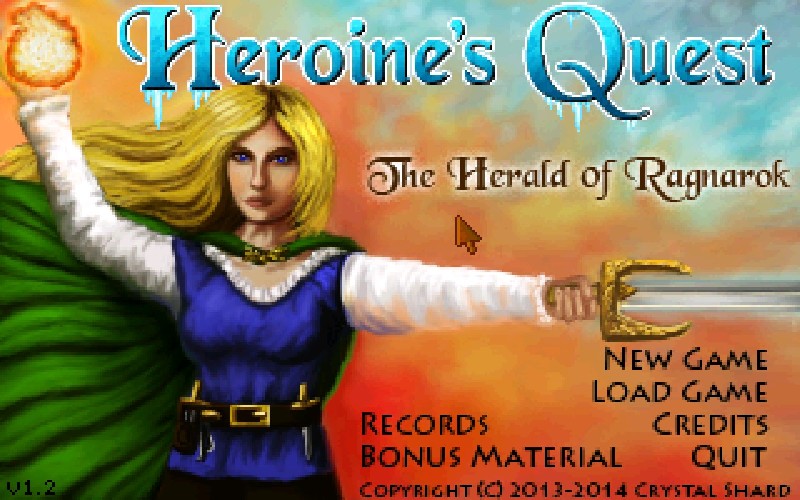
Once upon a time, in the halcyon days of 1989, Sierra released a strange game called Hero's Quest -- later rebranded Quest for Glory, due to Hasbro's corporate dickery. The game tried things that had never really been done before -- melding RPG character development, classes, combat, and exploration with adventure game-style puzzles and occasional moon-logic. That game spawned a remake and four quality sequels, comprising undoubtedly one of the finest game series of all time. In spite of its success and quality however, Quest for Glory never really spawned any imitators (other than the painfully mediocre BloodNet) and remained for the most part alone in its genre. Over the years there have been a few attempts by fans to create successors -- such as the ill-fated Hero6 project -- but none had come to fruition until finally, this year, Heroine's Quest: The Herald of Ragnarok was released by Crystal Shard Studios as freeware, following up on their excellent adventure game A Tale of Two Kingdoms.
Heroine's Quest is a game that does not so much politely borrow from Quest for Glory as it does tackle it and steal its stuff. Thankfully, it does so for the most part without damaging any of the elements that made QFG great; most everything from the originals is still there, including the three character classes, connections to real-world mythology, adventure game puzzles, stat-building through practice, exploration of a large, hostile forest, goofy, awkward humor, and multiple solutions to almost every situation. The only real difference is that your character has lady-parts. Because of all this it is almost inevitable that Heroine's Quest will be played through heavily tinted nostalgia goggles, but it is also a game that is worthy of consideration on its own merits. The borrowed mish-mash of features for the most part comes together successfully independent of its influences, though not without a few stumbles along the way. There are many elements to discuss, so let's get to it.
The Heroine
In spite of your character being a heroine rather than a hero appearing significant (y'know, with the title and stuff), sending out warnings of modern-Bioware-esque forced characterization, the eponymous heroine is actually something of a blank slate. Most dialogue options are fairly neutral, and nothing is ever really made of the character's gender. And no, there is no one romancing your character. Rather, the game leaves it up to you to define the heroine through your choices of actions; it is possible to be honorable or a scoundrel regardless of character class, and the game keeps track of your decisions, opening or closing certain potential options to you. It's not exactly choice and consequence, but you are at least the arbiter of your character's personality.
Character creation in HQ is a simple task, but has impressive consequences for gameplay. The main choices here are picking between the three classes -- Warrior, Sorceress, and Rogue -- and choosing what skills to pump your few starting bonus points in to. Your decisions here will determine what possible solutions to various obstacles are available to you throughout the game. For example, when faced with an icy cliff, a Warrior or Rogue might choose to practice their climbing skill in order to be able to scale it, while a Sorceress would simply scoff at them and teleport to the top. It is also possible to choose cross-class skills by spending a large number of your starting skill points, thus gaining access to alternate possible solutions. A Sorceress might choose the stealth skill in order to avoid dangerous enemies at night, or a Warrior might learn magic to be able to add a fireball or two to her arsenal in combat. The possibilities are numerous, and the range of options adds a lot to the potential replay value.
Character advancement happens constantly during gameplay, basically whenever you take an action. It's all fairly logical; climbing a tree increases your climbing skill, carrying a heavy load gradually increases your strength, casting spells improves their effectiveness, and so on. There is rarely a need to do any skill-grinding, although it does happen occasionally and was rather tedious when it did; the use of character skill to solve puzzles generally works well, but there are sometimes large jumps in the thresholds for success, and spending ten minutes watching the slow tree-climbing animation and gaining one or two points each time is not exactly my idea of fun. Still, for the most part such situations are few and far between, and don't detract too much from the overall gameplay.
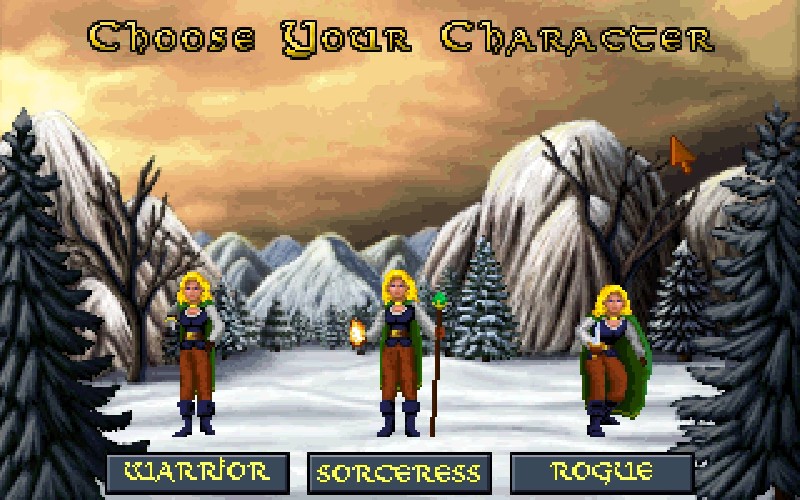
The Classes
As mentioned, there are three possible classes in the game, and each brings its own approach to gameplay.
The Rogue
The Rogue offers, by far, the most flexible gameplay style out of the three, and the most potential shortcuts through the game. With a focus on stealth and trickery, the Rogue gets a lot of unique opportunities, such as being able to break into houses, pick pocket items (including quest rewards!), and generally make a nuisance of herself. Playing a Rogue is a bit more challenging than in the Quest for Glory games, as there are a lot more opportunities to get caught. This can sometimes be a bit finicky, as being noticed by certain characters while carrying stolen items will result in a game over, and their movements can be a bit difficult to predict. It does add a greater sense of risk to breaking and entering at least.
Being a Rogue also allows for a lot more general creativity in puzzle solving and advancing through the game. If you're clever and observant, it is entirely possible to skip a good 50% of the game by pilfering items you would have otherwise had to complete various quests to obtain. Skipping most of the game isn't exactly recommended as the optional content is pretty excellent, but it's nice to know the option is there. Rogues are also fairly weak in combat intially (though they do improve rapidly), so a fairly cautious approach to potentially violent situations is warranted, and generally supported. And yes, with the judicious application of the stealth skill and good management of your stamina it is possible to completely avoid combat in Heroine's Quest.
All in all, the Rogue is probably the best option to take if you are more into the adventure game part rather than the RPG part of HQ. Combat can be a bit tricky, particularly against the tough enemies later in the game, and you're encouraged to find solutions via puzzles rather than face stabbing. It's still possible to take a more combat-oriented approach, but you generally won't get as many points for it.
The Sorceress
Playing a Sorceress involves finding spells, and using them judiciously to overcome obstacles. You can learn a dozen spells in total, some of which -- such as teleporting and sensing -- are primarily for puzzle solving, but most of which have applications both in and out of combat. In general you'll find a counter for every situation among your spells, and their creative use probably makes for some of the game's more interesting puzzles.
The main frustration the Sorceress will experience will probably be early on in the game when money is scarce and combat is difficult. Without the Rogue's ability to pilfer items, or the Warrior's ability to easily knock around enemies for cash, it can take a while until you're able to get all the money you need. It tends to devolve into a lot of waiting around and traipsing about the map looking for an enemy that will drop a few meagre coins (or possibly not). All this, plus the fact that you initially have no way to get to safety at night means that it is likely the most challenging class.
The Sorceress is simultaneously my favorite and least favorite class; the early game is a bit of a slog and can be pretty slow moving and frustrating, but once the game opens up a bit more later on and you have access to the majority of your spells, things really pick up. Combat becomes the most fun out of all the classes, and the Sorceress' unique puzzles feel the most clever throughout. And this is in spite of the fact that I never really enjoyed the Wizard class in the original QFG games.
The Warrior
Playing as a Warrior will generally lead to the most straight-forward approach to the game -- most of your problems can be solved through slashing, chopping, stabbing, or some combination thereof. Combat in general is easier, and you'll have access to a larger variety of weaponry than other classes in order to better deal with a variety of foes. That plus the fact that you get points for killing monsters rather than avoiding them means you're pretty well incentivized to take a combat-centric approach. Warriors are also the class for which the somewhat under-explained honor mechanic is most valuable, as having high honor can net you a few bonuses.
Although battle is their primary activity, Warriors also get the Animal Ken skill, allowing them to open up solutions to puzzles that make use of the wildlife around the world. So I suppose they're Rangers or something. This leads to some interesting puzzle solutions, although generally it just provides an easier shortcut to a solution than other classes have access to.
In general, Warriors will have a much easier time during the beginning of the game than the other classes, to the point that it is almost too easy. In order to have some challenge in combat early on you will probably have to pump up the difficulty a bit. The highest difficulty for a Warrior is roughly equivalent to medium difficulty for the other classes towards the start. The enemies closer to the end are a bit more challenging, but combat in general will always be a lot simpler as the Warrior, particularly once you pick up better weapons and armor. So, if you enjoy curbstomping enemies while solving the occasional skill-based puzzle, then Warriors are probably a good choice. Overall, though, it was my least favorite class to play through the game with.
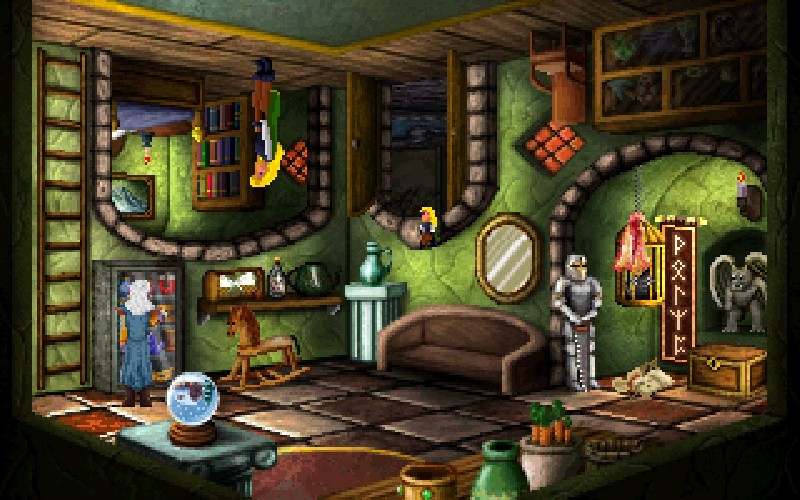
Wandering the World
A pretty large amount of the time when playing Heroine's Quest is spent wandering around the two fairly large world maps, looking for characters and areas of interest. It's worth mentioning here that the background graphics in the game are an absolutely fantastic example of pixel art, and add a lot to the exploration aspect. There are also quite a few easter eggs to be found, mostly consisting of characters from the actual Quest for Glory games. Every NPC in the game also has their own schedule, moving around the towns and the nearby areas based on the time of day. This scheduling is impressively detailed, though it can sometimes be a bit aggravating when you are looking for a particular NPC who is moving around in circles at the time. Outside of the towns, the world of HQ is basically a snow-covered version of the original Quest for Glory. You'll be wandering through a large forest dotted with various landmarks and dangers, and there is quite a bit to find and see. It definitely does an excellent job of capturing the sense of danger inherent in exploring unknown wilderness that was so palpable in QFG. Unlike QFG though, this game does provide you with an automap.
The automap is a feature that will probably be appreciated by some (and is occasionally required for certain puzzles later in the game), but it's actually something I could have done without, particularly due to the fact that it trivializes finding your objectives early on in the game by including a rudimentary quest compass. Fortunately that quest compass is rendered mostly useless around the halfway point of the game, but up until then it strikes me as simply being a shortcut for both the devs and the player. For the devs, because it saves them from having to provide travel instructions, but mostly for the player, who is basically hand-held through the first half of the main quest. It doesn't necessarily remove all the challenges of exploration and finding your objectives, but it is something that could have easily been dropped without losing anything.
Other than that, however, just wandering around the world and discovering things is a blast. My only real complaint is that the new 'cold' feature, where your stamina is gradually drained while you're outside in cold weather, feels a bit underdeveloped. It does serve to add a bit more danger to exploration, as you can't ever really stop to rest outside without quickly dying, but the whole mechanic could have been applied more creatively in-game. It's never really used as a part of any puzzles (other than the ongoing puzzle of staying alive, I suppose), and in a game where most other features tie into each other very well, it appears somewhat tacked-on.
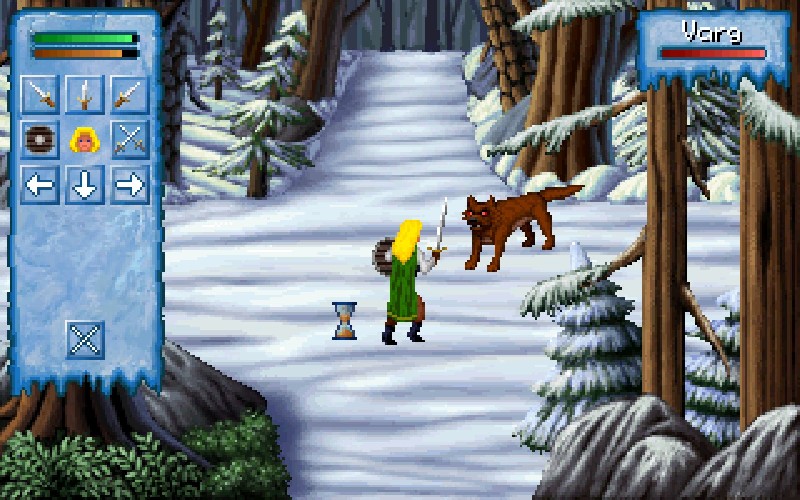
Combat (For Odinn!)
Combat is a big part of Heroine's Quest, as basically every time you enter a non-town screen there is a chance for an enemy to appear, who will then chase and attempt to do unspeakable things to the poor Heroine. It's possible to run away from any enemy so you never really have to fight, but doing so tends to slow down your progress, and besides, fighting's pretty fun. The combat system is most reminiscent of the Quest for Glory 2 remake by AGDI -- it is rather arcadey, in that you have to avoid enemy attacks (which they telegraph fairly obviously) by dodging in the correct direction, or blocking in the case of the Warrior.
There are eleven commonly encountered enemy types in total -- including wargs, trolls, jotunn, and dark elves among others -- plus a few unique ones. Each enemy has a different pattern of attack and defense that you'll have to learn, and combat can be a bit tricky (particularly on the higher difficulty levels) until you do. Once you have the patterns down though things become much easier. Fortunately new monsters get thrown at you regularly, keeping things from becoming overly tedious. How much you'll enjoy the combat system is probably predicated on how much of a tolerance you have for twitchy combat; it's not a button-mashing affair by any means, but it's not exactly tactically deep either -- most of the challenge comes from learning the correct timing rather than formulating any particular strategy.
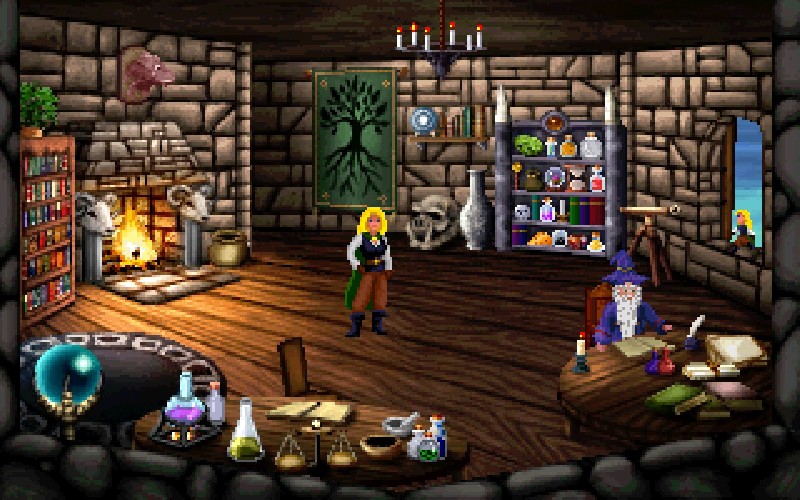
Voices and Music
Voice acting is an area where non-commercial games tend to stumble, occasionally making an otherwise decent game almost entirely unenjoyable due to piss-poor vocal performances. Fortunately, that isn't the case with Heroine's Quest. Though the voice acting is never really spectacular, it is also never incompetent, which is really all you can ask for when people are doing it for free. Mostly, it is on the semi-corny but enjoyable level of early Sierra games like King's Quest 5. The PC is also fully voiced, which I'm not a huge fan of in general, but the voice actress managed to do a good job for the most part of not forcing a personality upon the PC and just giving a competent delivery of the lines. The only text in the game that isn't voiced is the narration, which is actually a bit of a pity as one of the perpetual highights of Sierra's old adventure games was the inevitably snarky narrator informing you of your own incompetence, but I suppose the amount of voice acting required was prohibitively large.
The music on the other hand is a resounding positive. In general I will only notice music in games if it is either extremely bad or excellent, and in this case the musical tracks do a very good job of complementing the sense of exploration and danger present throughout the world. Without spoiling too much, the music is particularly good in the third city you reach, and the areas leading up to it. All-in-all, it's very impressive work for a group comprised of volunteers.
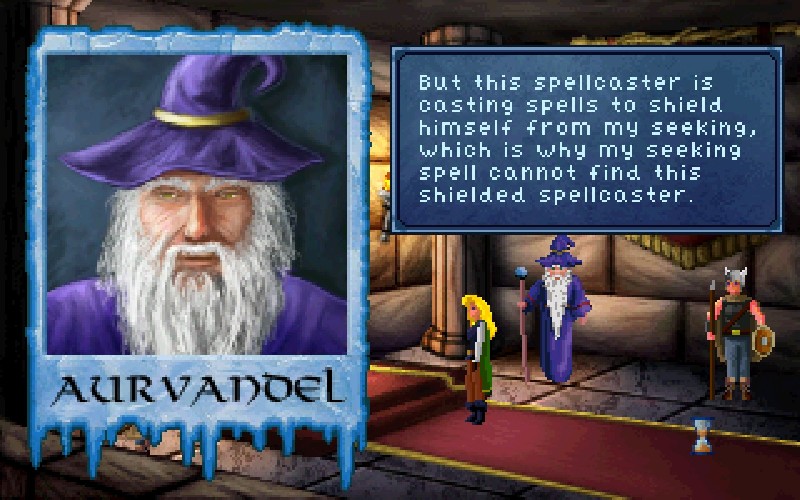
Writing and Lore
Here is where the game sees some of its greatest highs and lows. For the most part, the writing in this game is really, really good. As a huge mythology nerd I greatly appreciated the obvious amount of effort and research that went in to making sure that elements from the Poetic Edda were used appropriately. There is really a tremendous amount of lore included in the dialogue and narration of the game. The main story itself is nothing particularly special -- a standard save-the-world-from-the-big-bad plot -- but the detail with which it is presented and executed is frankly great. Basically every dialogue and much of the narration is packed full of snippets from the Edda, and you can spend an impressive amount of time just reading.
The dialogue is also, for the most part, very well done. It's clear that a lot of effort went into the writing, and the creativity often shows through, with characters like a wizard who speaks mainly in tautologies (that are tautological), a dark elf who can speak only by asking questions, and a doom-squirrel. All of the characters are generally very well-written. It's clear a lot of time was spent designing the dialogue trees and giving the NPCs personality that would make sense within the lore, and it all comes together nicely.
Where the writing tends to trip and fall flat on its face however is in its efforts at fourth-wall-breaking humor. Though a goofy sense of humor was always a part of the Quest for Glory games, in Heroine's Quest it tends to be done in a jarring way. One sequence where two characters suddenly, inexplicably broke into singing Bohemian Rhapsody was a particularly bizarre and head-scratching moment. This comes across as particularly egregious in a game where it is clear that so much effort has gone in to the overall lore and atmosphere of the world. Some of the characters, such as the aforementioned Wizard and a business-like bridge troll can occasionally be rather clever and funny, but sadly a lot of the attempts at humor are pretty inorganic and end up not really working. Still, these are a fairly minor part out of all the writing in the game, and the immersion smashing moments are thankfully few and far between. The only other (minor) complaint to be made about the writing is that a few of the lines could have used a little proofreading/editing, as they seem like they were written by a non-native speaker. Those are also few and far between however.
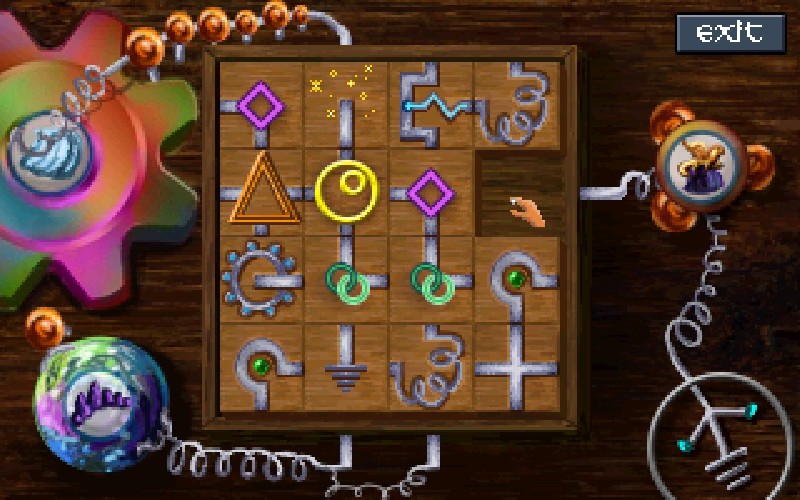
Puzzling Puzzles That Puzzle You
Heroine's Quest is, of course, an adventure/RPG hybrid, and so adventure game-style puzzles are a large part of the experience. However, as it's also an RPG your character's skills, spells and class play a large part in how they approach various situations. A Warrior with the Animal Ken skill might be able to catch a fox by simply talking to it, while a Rogue would have to rely on stealth. For the most part, these skill-based puzzles are all very well done, rarely defy logic, and give you a reason to play through the game more than once. Not all puzzles have mulitple solutions, but each of the classes has a few opportunities where their skills will provide shortcuts. Each class also has a few unique puzzles to solve, with the Rogue probably having the most.
Puzzle design in general is solid. Most puzzles -- whether class-based or inventory-based -- are logical, and you can usually find hints for all of them as long as you pay attention to dialogue and make good use of the 'look' command. There are, though, a few puzzles that are devilishly difficult, particularly one involving crystals for which there are basically no hints. Heroine's Quest also commits the cardinal sin of including a sliding-tile puzzle, although this is one of the less-offensive implementations in an adventure game, as there are multiple possible solutions, and it is actually only mandatory for one class.
The overall difficulty of the puzzles, aside from the few previously mentioned, is fairly moderate. You'll have to think a bit and explore the world carefully, but there are no puzzles that are so out-of-this world logic-wise that they're likely to be a major stopping point. That plus the fact that you generally have a fair number of things to do -- there is a large amount of optional content in the game, though it's only 100% optional for the Rogue -- mean that being completely stuck is likely to be a rare occurence. Getting full points on the other hand is quite challenging and requires you to always do the things appropriate to your class; a Rogue should always steal when possible, a Sorceress should strive to use spells, and a Warrior should always enter combat and search for new weapons. It's worth trying to max out your score, as you're likely to find a few interesting optional sections you would have otherwise missed.
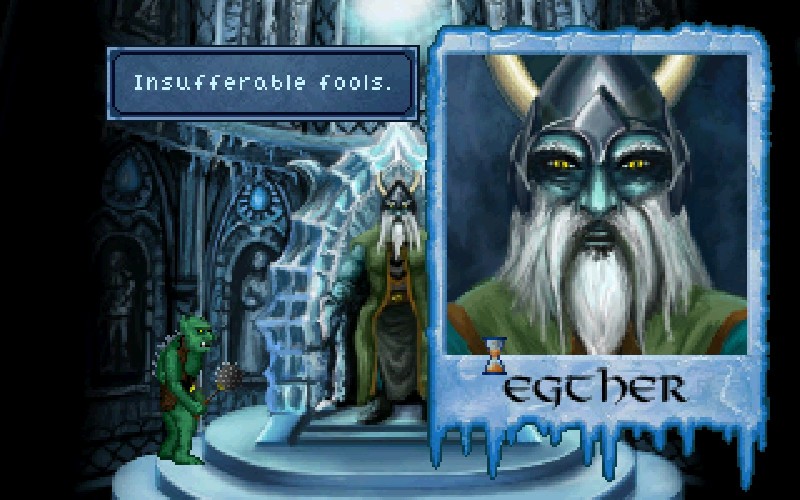
Conclusion
So, after all that, is it worth playing? The answer is very much yes, particularly given that it's free. Heroine's Quest is of a good enough quality that it could be considered a proper entry in the original Quest for Glory series, and that is high praise indeed. It's a well-crafted look back at an era of games that we haven't seen for a long time, but it can very much stand on its own independent of any nostalgia.
Heroine's Quest: The Herald of Ragnarok is a freeware adventure/RPG in the vein of the Quest for Glory games. Download it on Steam!

Once upon a time, in the halcyon days of 1989, Sierra released a strange game called Hero's Quest -- later rebranded Quest for Glory, due to Hasbro's corporate dickery. The game tried things that had never really been done before -- melding RPG character development, classes, combat, and exploration with adventure game-style puzzles and occasional moon-logic. That game spawned a remake and four quality sequels, comprising undoubtedly one of the finest game series of all time. In spite of its success and quality however, Quest for Glory never really spawned any imitators (other than the painfully mediocre BloodNet) and remained for the most part alone in its genre. Over the years there have been a few attempts by fans to create successors -- such as the ill-fated Hero6 project -- but none had come to fruition until finally, this year, Heroine's Quest: The Herald of Ragnarok was released by Crystal Shard Studios as freeware, following up on their excellent adventure game A Tale of Two Kingdoms.
Heroine's Quest is a game that does not so much politely borrow from Quest for Glory as it does tackle it and steal its stuff. Thankfully, it does so for the most part without damaging any of the elements that made QFG great; most everything from the originals is still there, including the three character classes, connections to real-world mythology, adventure game puzzles, stat-building through practice, exploration of a large, hostile forest, goofy, awkward humor, and multiple solutions to almost every situation. The only real difference is that your character has lady-parts. Because of all this it is almost inevitable that Heroine's Quest will be played through heavily tinted nostalgia goggles, but it is also a game that is worthy of consideration on its own merits. The borrowed mish-mash of features for the most part comes together successfully independent of its influences, though not without a few stumbles along the way. There are many elements to discuss, so let's get to it.
The Heroine
In spite of your character being a heroine rather than a hero appearing significant (y'know, with the title and stuff), sending out warnings of modern-Bioware-esque forced characterization, the eponymous heroine is actually something of a blank slate. Most dialogue options are fairly neutral, and nothing is ever really made of the character's gender. And no, there is no one romancing your character. Rather, the game leaves it up to you to define the heroine through your choices of actions; it is possible to be honorable or a scoundrel regardless of character class, and the game keeps track of your decisions, opening or closing certain potential options to you. It's not exactly choice and consequence, but you are at least the arbiter of your character's personality.
Character creation in HQ is a simple task, but has impressive consequences for gameplay. The main choices here are picking between the three classes -- Warrior, Sorceress, and Rogue -- and choosing what skills to pump your few starting bonus points in to. Your decisions here will determine what possible solutions to various obstacles are available to you throughout the game. For example, when faced with an icy cliff, a Warrior or Rogue might choose to practice their climbing skill in order to be able to scale it, while a Sorceress would simply scoff at them and teleport to the top. It is also possible to choose cross-class skills by spending a large number of your starting skill points, thus gaining access to alternate possible solutions. A Sorceress might choose the stealth skill in order to avoid dangerous enemies at night, or a Warrior might learn magic to be able to add a fireball or two to her arsenal in combat. The possibilities are numerous, and the range of options adds a lot to the potential replay value.
Character advancement happens constantly during gameplay, basically whenever you take an action. It's all fairly logical; climbing a tree increases your climbing skill, carrying a heavy load gradually increases your strength, casting spells improves their effectiveness, and so on. There is rarely a need to do any skill-grinding, although it does happen occasionally and was rather tedious when it did; the use of character skill to solve puzzles generally works well, but there are sometimes large jumps in the thresholds for success, and spending ten minutes watching the slow tree-climbing animation and gaining one or two points each time is not exactly my idea of fun. Still, for the most part such situations are few and far between, and don't detract too much from the overall gameplay.

The Classes
As mentioned, there are three possible classes in the game, and each brings its own approach to gameplay.
The Rogue
The Rogue offers, by far, the most flexible gameplay style out of the three, and the most potential shortcuts through the game. With a focus on stealth and trickery, the Rogue gets a lot of unique opportunities, such as being able to break into houses, pick pocket items (including quest rewards!), and generally make a nuisance of herself. Playing a Rogue is a bit more challenging than in the Quest for Glory games, as there are a lot more opportunities to get caught. This can sometimes be a bit finicky, as being noticed by certain characters while carrying stolen items will result in a game over, and their movements can be a bit difficult to predict. It does add a greater sense of risk to breaking and entering at least.
Being a Rogue also allows for a lot more general creativity in puzzle solving and advancing through the game. If you're clever and observant, it is entirely possible to skip a good 50% of the game by pilfering items you would have otherwise had to complete various quests to obtain. Skipping most of the game isn't exactly recommended as the optional content is pretty excellent, but it's nice to know the option is there. Rogues are also fairly weak in combat intially (though they do improve rapidly), so a fairly cautious approach to potentially violent situations is warranted, and generally supported. And yes, with the judicious application of the stealth skill and good management of your stamina it is possible to completely avoid combat in Heroine's Quest.
All in all, the Rogue is probably the best option to take if you are more into the adventure game part rather than the RPG part of HQ. Combat can be a bit tricky, particularly against the tough enemies later in the game, and you're encouraged to find solutions via puzzles rather than face stabbing. It's still possible to take a more combat-oriented approach, but you generally won't get as many points for it.
The Sorceress
Playing a Sorceress involves finding spells, and using them judiciously to overcome obstacles. You can learn a dozen spells in total, some of which -- such as teleporting and sensing -- are primarily for puzzle solving, but most of which have applications both in and out of combat. In general you'll find a counter for every situation among your spells, and their creative use probably makes for some of the game's more interesting puzzles.
The main frustration the Sorceress will experience will probably be early on in the game when money is scarce and combat is difficult. Without the Rogue's ability to pilfer items, or the Warrior's ability to easily knock around enemies for cash, it can take a while until you're able to get all the money you need. It tends to devolve into a lot of waiting around and traipsing about the map looking for an enemy that will drop a few meagre coins (or possibly not). All this, plus the fact that you initially have no way to get to safety at night means that it is likely the most challenging class.
The Sorceress is simultaneously my favorite and least favorite class; the early game is a bit of a slog and can be pretty slow moving and frustrating, but once the game opens up a bit more later on and you have access to the majority of your spells, things really pick up. Combat becomes the most fun out of all the classes, and the Sorceress' unique puzzles feel the most clever throughout. And this is in spite of the fact that I never really enjoyed the Wizard class in the original QFG games.
The Warrior
Playing as a Warrior will generally lead to the most straight-forward approach to the game -- most of your problems can be solved through slashing, chopping, stabbing, or some combination thereof. Combat in general is easier, and you'll have access to a larger variety of weaponry than other classes in order to better deal with a variety of foes. That plus the fact that you get points for killing monsters rather than avoiding them means you're pretty well incentivized to take a combat-centric approach. Warriors are also the class for which the somewhat under-explained honor mechanic is most valuable, as having high honor can net you a few bonuses.
Although battle is their primary activity, Warriors also get the Animal Ken skill, allowing them to open up solutions to puzzles that make use of the wildlife around the world. So I suppose they're Rangers or something. This leads to some interesting puzzle solutions, although generally it just provides an easier shortcut to a solution than other classes have access to.
In general, Warriors will have a much easier time during the beginning of the game than the other classes, to the point that it is almost too easy. In order to have some challenge in combat early on you will probably have to pump up the difficulty a bit. The highest difficulty for a Warrior is roughly equivalent to medium difficulty for the other classes towards the start. The enemies closer to the end are a bit more challenging, but combat in general will always be a lot simpler as the Warrior, particularly once you pick up better weapons and armor. So, if you enjoy curbstomping enemies while solving the occasional skill-based puzzle, then Warriors are probably a good choice. Overall, though, it was my least favorite class to play through the game with.

Wandering the World
A pretty large amount of the time when playing Heroine's Quest is spent wandering around the two fairly large world maps, looking for characters and areas of interest. It's worth mentioning here that the background graphics in the game are an absolutely fantastic example of pixel art, and add a lot to the exploration aspect. There are also quite a few easter eggs to be found, mostly consisting of characters from the actual Quest for Glory games. Every NPC in the game also has their own schedule, moving around the towns and the nearby areas based on the time of day. This scheduling is impressively detailed, though it can sometimes be a bit aggravating when you are looking for a particular NPC who is moving around in circles at the time. Outside of the towns, the world of HQ is basically a snow-covered version of the original Quest for Glory. You'll be wandering through a large forest dotted with various landmarks and dangers, and there is quite a bit to find and see. It definitely does an excellent job of capturing the sense of danger inherent in exploring unknown wilderness that was so palpable in QFG. Unlike QFG though, this game does provide you with an automap.
The automap is a feature that will probably be appreciated by some (and is occasionally required for certain puzzles later in the game), but it's actually something I could have done without, particularly due to the fact that it trivializes finding your objectives early on in the game by including a rudimentary quest compass. Fortunately that quest compass is rendered mostly useless around the halfway point of the game, but up until then it strikes me as simply being a shortcut for both the devs and the player. For the devs, because it saves them from having to provide travel instructions, but mostly for the player, who is basically hand-held through the first half of the main quest. It doesn't necessarily remove all the challenges of exploration and finding your objectives, but it is something that could have easily been dropped without losing anything.
Other than that, however, just wandering around the world and discovering things is a blast. My only real complaint is that the new 'cold' feature, where your stamina is gradually drained while you're outside in cold weather, feels a bit underdeveloped. It does serve to add a bit more danger to exploration, as you can't ever really stop to rest outside without quickly dying, but the whole mechanic could have been applied more creatively in-game. It's never really used as a part of any puzzles (other than the ongoing puzzle of staying alive, I suppose), and in a game where most other features tie into each other very well, it appears somewhat tacked-on.

Combat (For Odinn!)
Combat is a big part of Heroine's Quest, as basically every time you enter a non-town screen there is a chance for an enemy to appear, who will then chase and attempt to do unspeakable things to the poor Heroine. It's possible to run away from any enemy so you never really have to fight, but doing so tends to slow down your progress, and besides, fighting's pretty fun. The combat system is most reminiscent of the Quest for Glory 2 remake by AGDI -- it is rather arcadey, in that you have to avoid enemy attacks (which they telegraph fairly obviously) by dodging in the correct direction, or blocking in the case of the Warrior.
There are eleven commonly encountered enemy types in total -- including wargs, trolls, jotunn, and dark elves among others -- plus a few unique ones. Each enemy has a different pattern of attack and defense that you'll have to learn, and combat can be a bit tricky (particularly on the higher difficulty levels) until you do. Once you have the patterns down though things become much easier. Fortunately new monsters get thrown at you regularly, keeping things from becoming overly tedious. How much you'll enjoy the combat system is probably predicated on how much of a tolerance you have for twitchy combat; it's not a button-mashing affair by any means, but it's not exactly tactically deep either -- most of the challenge comes from learning the correct timing rather than formulating any particular strategy.

Voices and Music
Voice acting is an area where non-commercial games tend to stumble, occasionally making an otherwise decent game almost entirely unenjoyable due to piss-poor vocal performances. Fortunately, that isn't the case with Heroine's Quest. Though the voice acting is never really spectacular, it is also never incompetent, which is really all you can ask for when people are doing it for free. Mostly, it is on the semi-corny but enjoyable level of early Sierra games like King's Quest 5. The PC is also fully voiced, which I'm not a huge fan of in general, but the voice actress managed to do a good job for the most part of not forcing a personality upon the PC and just giving a competent delivery of the lines. The only text in the game that isn't voiced is the narration, which is actually a bit of a pity as one of the perpetual highights of Sierra's old adventure games was the inevitably snarky narrator informing you of your own incompetence, but I suppose the amount of voice acting required was prohibitively large.
The music on the other hand is a resounding positive. In general I will only notice music in games if it is either extremely bad or excellent, and in this case the musical tracks do a very good job of complementing the sense of exploration and danger present throughout the world. Without spoiling too much, the music is particularly good in the third city you reach, and the areas leading up to it. All-in-all, it's very impressive work for a group comprised of volunteers.

Writing and Lore
Here is where the game sees some of its greatest highs and lows. For the most part, the writing in this game is really, really good. As a huge mythology nerd I greatly appreciated the obvious amount of effort and research that went in to making sure that elements from the Poetic Edda were used appropriately. There is really a tremendous amount of lore included in the dialogue and narration of the game. The main story itself is nothing particularly special -- a standard save-the-world-from-the-big-bad plot -- but the detail with which it is presented and executed is frankly great. Basically every dialogue and much of the narration is packed full of snippets from the Edda, and you can spend an impressive amount of time just reading.
The dialogue is also, for the most part, very well done. It's clear that a lot of effort went into the writing, and the creativity often shows through, with characters like a wizard who speaks mainly in tautologies (that are tautological), a dark elf who can speak only by asking questions, and a doom-squirrel. All of the characters are generally very well-written. It's clear a lot of time was spent designing the dialogue trees and giving the NPCs personality that would make sense within the lore, and it all comes together nicely.
Where the writing tends to trip and fall flat on its face however is in its efforts at fourth-wall-breaking humor. Though a goofy sense of humor was always a part of the Quest for Glory games, in Heroine's Quest it tends to be done in a jarring way. One sequence where two characters suddenly, inexplicably broke into singing Bohemian Rhapsody was a particularly bizarre and head-scratching moment. This comes across as particularly egregious in a game where it is clear that so much effort has gone in to the overall lore and atmosphere of the world. Some of the characters, such as the aforementioned Wizard and a business-like bridge troll can occasionally be rather clever and funny, but sadly a lot of the attempts at humor are pretty inorganic and end up not really working. Still, these are a fairly minor part out of all the writing in the game, and the immersion smashing moments are thankfully few and far between. The only other (minor) complaint to be made about the writing is that a few of the lines could have used a little proofreading/editing, as they seem like they were written by a non-native speaker. Those are also few and far between however.

Puzzling Puzzles That Puzzle You
Heroine's Quest is, of course, an adventure/RPG hybrid, and so adventure game-style puzzles are a large part of the experience. However, as it's also an RPG your character's skills, spells and class play a large part in how they approach various situations. A Warrior with the Animal Ken skill might be able to catch a fox by simply talking to it, while a Rogue would have to rely on stealth. For the most part, these skill-based puzzles are all very well done, rarely defy logic, and give you a reason to play through the game more than once. Not all puzzles have mulitple solutions, but each of the classes has a few opportunities where their skills will provide shortcuts. Each class also has a few unique puzzles to solve, with the Rogue probably having the most.
Puzzle design in general is solid. Most puzzles -- whether class-based or inventory-based -- are logical, and you can usually find hints for all of them as long as you pay attention to dialogue and make good use of the 'look' command. There are, though, a few puzzles that are devilishly difficult, particularly one involving crystals for which there are basically no hints. Heroine's Quest also commits the cardinal sin of including a sliding-tile puzzle, although this is one of the less-offensive implementations in an adventure game, as there are multiple possible solutions, and it is actually only mandatory for one class.
The overall difficulty of the puzzles, aside from the few previously mentioned, is fairly moderate. You'll have to think a bit and explore the world carefully, but there are no puzzles that are so out-of-this world logic-wise that they're likely to be a major stopping point. That plus the fact that you generally have a fair number of things to do -- there is a large amount of optional content in the game, though it's only 100% optional for the Rogue -- mean that being completely stuck is likely to be a rare occurence. Getting full points on the other hand is quite challenging and requires you to always do the things appropriate to your class; a Rogue should always steal when possible, a Sorceress should strive to use spells, and a Warrior should always enter combat and search for new weapons. It's worth trying to max out your score, as you're likely to find a few interesting optional sections you would have otherwise missed.

Conclusion
So, after all that, is it worth playing? The answer is very much yes, particularly given that it's free. Heroine's Quest is of a good enough quality that it could be considered a proper entry in the original Quest for Glory series, and that is high praise indeed. It's a well-crafted look back at an era of games that we haven't seen for a long time, but it can very much stand on its own independent of any nostalgia.











